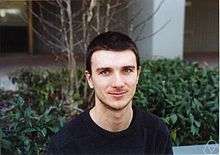Ovidiu Savin
| Ovidiu Savin | |
|---|---|
 Savin in 2003 | |
| Born | 1 January 1977 |
| Nationality | Romanian |
| Alma mater | University of Texas at Austin |
| Awards | Stampacchia Medal (2012) |
| Scientific career | |
| Fields | Mathematics |
| Institutions | Columbia University |
| Doctoral advisor | Luis Caffarelli |
Ovidiu Savin (born January 1, 1977) is a Romanian mathematician who is active in the field of the partial differential equations.
Scientific activity
Savin received his Ph.D. in mathematics from the University of Texas at Austin in 2003 having Luis Caffarelli as advisor; he is professor of mathematics at Columbia University. Savin is mostly known for his important work on De Giorgi's conjecture about global solutions to certain semilinear equations, that he proved up to dimension 8.[1] It is to be noticed that the conjecture turns out to be false in higher dimensions, as eventually proved by del Pino, Kowalczyk, and Wei.[2] Savin has also worked on various regularity questions proving the gradient continuity of solutions to the infinity-Laplacian equation in two dimensions and obtaining results on the boundary regularity of solutions to the Monge–Ampère equation.
Recognition
Savin won a gold medal with a perfect score in the 1995 International Mathematical Olympiad.[3] As an undergraduate at the University of Pittsburgh in 1997, Savin was a William Lowell Putnam Mathematical Competition fellow.[4] Savin was an invited speaker at the International Congress of Mathematicians in 2006.[5] He was awarded the Stampacchia Medal in 2012.
References
- ↑ "Regularity of flat level sets in phase transitions". Annals of Mathematics. Retrieved May 5, 2013.
- ↑ "On De Giorgi's conjecture in dimension N≥9". Annals of Mathematics. Retrieved May 5, 2013.
- ↑ "International Mathematical Olympiad". www.imo-official.org. Retrieved 8 August 2016.
- ↑ "The Mathematical Association of America's William Lowell Putnam Competition". Retrieved May 11, 2013.
- ↑ "International Congress of Mathematicians 2006". Retrieved May 5, 2013.